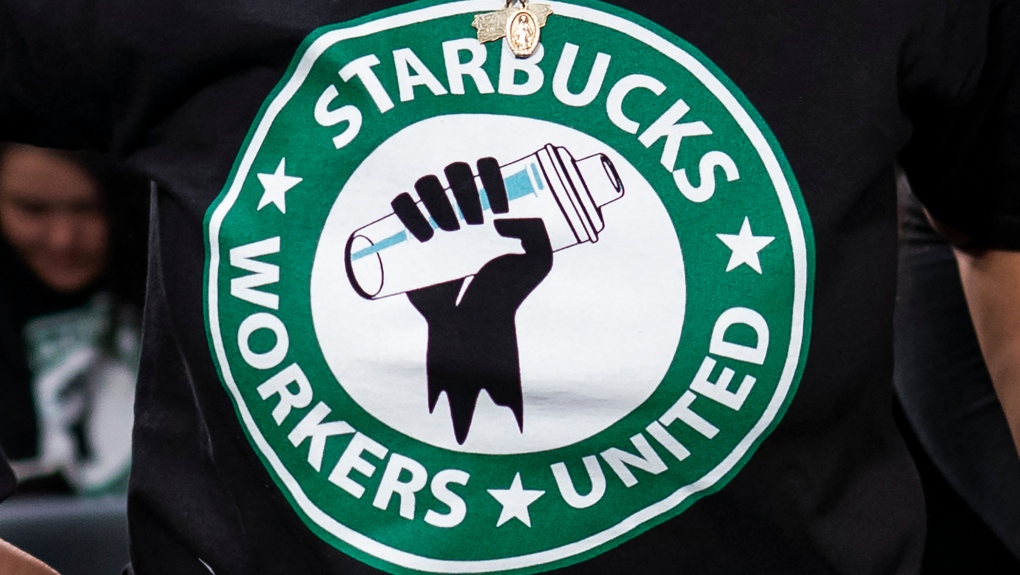Why people are boycotting Starbucks in solidarity with Palestine
 File - The Starbucks Workers United logo appears on the shirt of a person attending a hearing in Washington on March 29, 2023. Starbucks sued the union organizing its workers Wednesday, saying a pro-Palestine social media post from a union account early in the Israel-Hamas war angered hundreds of customers and damaged its reputation. (AP Photo/J. Scott Applewhite, File)
File - The Starbucks Workers United logo appears on the shirt of a person attending a hearing in Washington on March 29, 2023. Starbucks sued the union organizing its workers Wednesday, saying a pro-Palestine social media post from a union account early in the Israel-Hamas war angered hundreds of customers and damaged its reputation. (AP Photo/J. Scott Applewhite, File)
Some Edmontonians in the Palestine community are boycotting Starbucks after the company sued the union organizing its workers for a pro-Palestine post on social media last month.
According to the Associated Press, shortly after the start of the Israel-Gaza conflict, a Starbucks Workers United account tweeted support for Palestine.
Starbucks filed a lawsuit against Workers United over the post, saying it angered hundreds of customers and damaged its reputation.
The group sued Starbucks in response and said the tweet, which was up for about 40 minutes before it was deleted, was posted without the authorization of union leaders.
A woman from Edmonton's Palestinian community said she’s boycotting because she doesn't want to financially contribute to the oppression of Palestinians.
“The Starbucks workers union spoke out in support of Palestine, and Starbucks threatened to sue. Now, we are boycotting. And will continue to boycott any company,” Abraar Alsiwadi said.
For Abraar, her connection to the cause is deeply personal as it’s rooted in her own experience.
“I am a Palestinian from the town of Silwad in the West Bank. I made a promise to myself to do everything in my power to be a voice for my people and to spread as much awareness as I can.”
Abraar believes that boycotting collectively on a large scale can end systemic oppression.
“For example, the anti-apartheid movement in South Africa which actually began as a boycott movement. I also believe that even if it does not make a big difference, that would not stop me from boycotting as it would go against my morals."
Starbucks' statements on the war have expressed sympathy for innocent victims in both Israel and Gaza.
“Starbucks unequivocally condemns acts of hate, terrorism and violence,” Starbucks Executive Vice President Sara Kelly wrote in a letter earlier in October.
With files from the Associated Press
CTVNews.ca Top Stories

Poilievre writes to GG calling for House recall, confidence vote after Singh declares he's ready to bring Liberals down
Conservative Leader Pierre Poilievre has written to Gov. Gen. Mary Simon, imploring her to 'use your authority to inform the prime minister that he must' recall the House of Commons so a non-confidence vote can be held. This move comes in light of NDP Leader Jagmeet Singh publishing a letter stating his caucus 'will vote to bring this government down' sometime in 2025.
BREAKING At least 2 dead and 60 hurt after a car drives into a German Christmas market in a suspected attack
A car plowed into a busy outdoor Christmas market in the eastern German city of Magdeburg on Friday, killing at least two people and injuring at least 60 others in what authorities suspect was an attack.
Judge sentences Quebecer convicted of triple murder who shows 'no remorse'
A Quebecer convicted in a triple murder on Montreal's South Shore has been sentenced to life in prison without chance of parole for 20 years in the second-degree death of Synthia Bussieres.
'I understand there's going to be a short runway,' new minister says after Trudeau shuffles cabinet
Prime Minister Justin Trudeau added eight Liberal MPs to his front bench and reassigned four ministers in a cabinet shuffle in Ottawa on Friday, but as soon as they were sworn-in, they faced questions about the political future of their government, and their leader.
Fake nurse Brigitte Cleroux sentenced for B.C. crimes
A woman who impersonated nurses in several provinces has been sentenced to seven years in prison for offences in British Columbia – where she illegally treated nearly 1,000 patients across multiple communities.
Poilievre to Trump: 'Canada will never be the 51st state'
Conservative leader Pierre Poilievre is responding to U.S. president-elect Donald Trump’s ongoing suggestions that Canada become the 51st state, saying it will 'never happen.'
A new book about Chrystia Freeland just came out. Here's what we learned
A new book about Chrystia Freeland has just come out, after the publishing company sped up its release date by a few months. CTV News sifted through the book and pulled out some notable anecdotes, as well as insights about Freeland's relationship with the prime minister.
Toronto officials warn of possible measles exposure at Pearson airport
Toronto Public Health (TPH) is advising of another possible measles exposure at Canada’s largest airport.
Bail denied for Winnipeg woman accused of killing animals in online videos
Warning: This story contains disturbing details. Discretion is advised. A Winnipeg woman accused of making videos of animals being tortured and killed that were sold on the dark web was denied bail.































